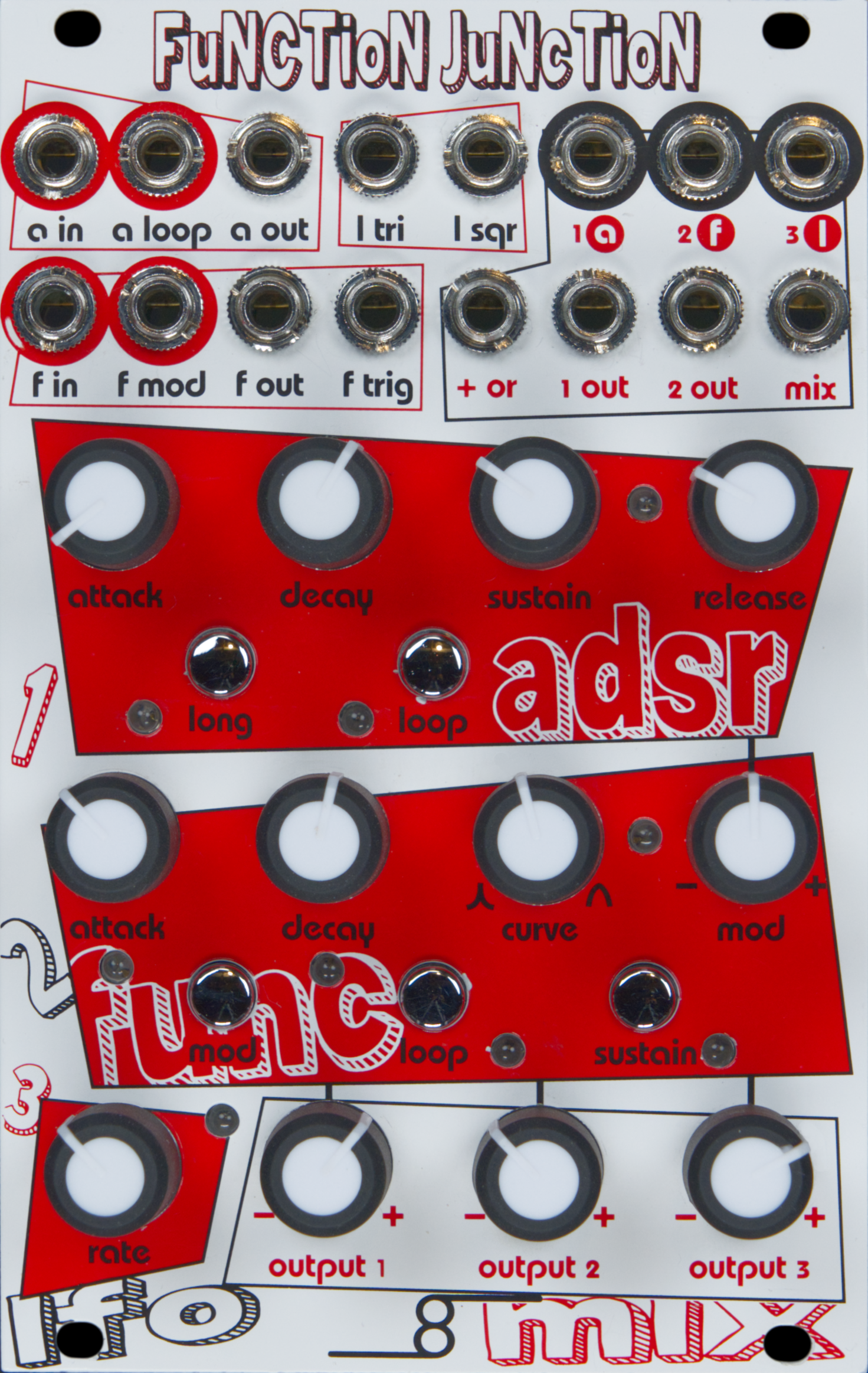A party of functions

Function Junction came about because one of our product managers was bothering our serious friends (we like them at least) at Pittsburgh Modular Synthesizers. They were complaining that many-function-in-one modules were confusing to use and were trying to accomplish too much, and therefore not really good any single function. Oddly, the stoic folks at Pittsburgh Modular agreed with him (for once) and took this as a challenge. A few days later they came back with what would be the panel design for this module.
Function Junction combines three classic analog modulation sources, ADSR envelope, function generator, and LFO. All are fed into an attenuverting mixer to create a complex modulation junction that can be used as 4 independent sections or in conjunction with each other.
The magic of the module is the ease you can flow from using its functions for basic everyday tasks to creating hyper-complex modulation. The sheer breadth of what you can do and the ease of doing it are pretty amazing (if we don’t say so ourselves).
Normally we’re not manual readers, but in this case we highly recommend reading the manual to get a feel for the possibilities. Don’t worry, you can go back to playing Space Invaders after you get done reading.
SPECS
-
Width = 16hp
-
Depth = 30mm
-
Power draw
-
130mA when running +12V rail
-
70mA when running -12V
-
-
ADSR / Envelope facts
-
Fully analog Pittsburgh Modular Synthesizers developed 4 stage ADSR circuit with independent Attack, Decay, Sustain and Release controls.
-
Voltage output range 0V - 10V
-
“Long” button doubles the length of the envelope attack, decay, and release times
-
“Loop” button enables/disables envelope cycling. The SUSTAIN KNOB and RELEASE KNOB are used to adjust the time it takes to loop.
-
“A LOOP JACK” - Enables/disable loop mode. An external gate signal will flip the state of the loop mode. If loop mode is on, the gate will turn loop mode off. If loop mode is off, the external gate will turn loop mode on.
-
-
Function Generator facts
-
Function Generator can be used as an envelope generator, a voltage controlled LFO, a slew generator, a gate signal delay, envelope follower, a clock source, voltage controlled clock divider, complex modulation source, and more
-
Voltage output range +/-5V
-
ATTACK KNOB - Attack duration control knob.
-
DECAY KNOB - Decay duration control knob.
-
CURVE KNOB - Attack and decay response curve. Exponential (full left), Linear (12 o’clock), Logarithmic (full right)
-
MOD KNOB - Modulation input (F MOD JACK) attenuverter knob.
-
MOD BUTTON - Assign Modulation input (F MOD JACK) to attack, decay, or both.
-
LOOP BUTTON - Enable/Disable loop mode.
-
LOOP BUTTON (2nd FUNCTION) - Press and hold MOD BUTTON then press LOOP BUTTON to assign A LOOP JACK destination to ADSR or function generator.
-
SUSTAIN BUTTON - Enable/Disable sustain mode.
-
F IN JACK - Function Generator trigger/gate input gate jack.
-
F MOD JACK - Function Generator modulation input jack.
-
F OUT JACK - Function Generator output jack.
-
F TRIG JACK - Function Generator end of decay trigger output jack. A trigger is output at the end of the decay stage.
-
-
LFO facts
-
Triangle and Square LFO outs
-
Dedicated rate knob
-
LFO output voltage +/-8V
-
-
Mixer facts
-
3 channel attenuverting mixer with OR circuit
-
Mixer can be split into 3 independent attenuverters, one two-channel mixer, and one attenuverter, or a three-channel mixer
-
OUTPUT 1 KNOB - Channel 1 input (1A JACK) attenuverter knob.
-
OUTPUT 2 KNOB - Channel 2 input (2F JACK) attenuverter knob.
-
OUTPUT 3 KNOB - Channel 3 input (3L JACK) attenuverter knob.
-
1A JACK - Channel 1 input jack. Normaled to ADSR output.
-
2F JACK - Channel 2 input jack. Normaled to function generator output.
-
3L JACK - Channel 3 input jack. Normaled to LFO output.
-
+OR JACK - Analog logic output jack.
-
OR circuit outputs the current highest voltage value of any of the voltages output by the mixer
-
-
1 OUT JACK - Channel 1 breakout output.
-
2 OUT JACK - Channel 2 breakout output.
-
MIX JACK - Mixer output.
-

